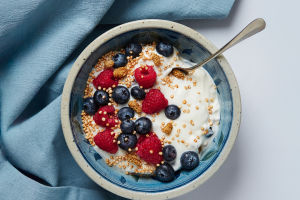More and more people are embracing plant-based diets for their health benefits, and for good reason.
A vegetarian diet, when properly planned, is packed with nutrients that can help prevent chronic diseases, promote overall health, and even improve longevity.
But as with any dietary shift, we need to make sure we're meeting all our nutritional needs, including protein, iron, and vitamin B12.
In this article, we'll explore the nutritional value of a vegetarian diet, the benefits it offers, and how we can ensure we're getting the essential nutrients our bodies need for optimal health.
The Health Benefits of a Vegetarian Diet
Adopting a vegetarian diet can bring many health benefits. Research has shown that vegetarians often have lower risks of heart disease, high blood pressure, type 2 diabetes, and certain types of cancer. These benefits are largely due to the high intake of fruits, vegetables, whole grains, and legumes, which are rich in antioxidants, fiber, and other essential nutrients.
One of the key advantages of vegetarianism is its ability to reduce the intake of saturated fats and cholesterol, both of which are linked to heart disease. Plant-based foods tend to be lower in these harmful fats, which can help promote better heart health.
Furthermore, a vegetarian diet can support healthy weight management. Many plant-based foods are low in calories and high in fiber, which helps with digestion and keeps us feeling fuller for longer. This can aid in weight loss or maintenance when combined with a balanced lifestyle.
Ensuring Sufficient Protein Intake
One of the most common concerns people have when switching to a vegetarian diet is how to get enough protein. After all, protein is an essential nutrient for muscle growth, tissue repair, and immune function. Fortunately, there are plenty of plant-based protein sources to include in our diet.
Legumes such as beans, lentils, and chickpeas are excellent sources of protein. They're also rich in fiber, which helps with digestion and blood sugar regulation. Tofu, tempeh, and edamame (young soybeans) are also high in protein and can be used in a variety of dishes, from stir-fries to salads.
Nuts and seeds, such as almonds, chia seeds, and flaxseeds seeds, provide a good amount of protein and healthy fats. Whole grains like quinoa, brown rice, and oats are also great sources of protein, along with a variety of vitamins and minerals.
For those who are concerned about protein quality, combining different plant-based protein sources (such as beans and rice) can provide all the essential amino acids the body needs.
Getting Enough Iron on a Vegetarian Diet
Iron is another critical nutrient that vegetarians need to pay attention to. While iron from plant-based sources (non-heme iron) isn't absorbed as easily as the iron found in animal products (heme iron), it's still possible to meet our iron needs with a well-balanced vegetarian diet.
Foods rich in iron include spinach, lentils, chickpeas, quinoa, pumpkin seeds, and fortified cereals. To boost the absorption of non-heme iron, it's important to consume them with vitamin C-rich foods, such as oranges, strawberries, bell peppers, and tomatoes. Vitamin C enhances the absorption of iron and ensures we're getting the full benefit of iron-rich foods.
However, vegetarians may need to be mindful of their iron levels, especially if they're prone to iron deficiency anemia. In some cases, a supplement may be necessary, but it's always best to consult a healthcare professional before adding any supplements to your routine.
The Importance of Vitamin B12
Vitamin B12 is one of the most critical nutrients that vegetarians may struggle to get enough of. This vitamin plays a key role in nerve function, red blood cell production, and DNA synthesis. However, vitamin B12 is found primarily in animal products, which makes it challenging for those on a vegetarian diet to meet their needs.
To combat this, many plant-based eaters rely on fortified foods, such as plant-based milks, breakfast cereals, and nutritional yeast, which are often enriched with B12. It's also possible to take a B12 supplement if necessary. Vegetarians should pay attention to their B12 intake and consider speaking with a doctor or dietitian about appropriate supplementation.
Regular blood tests can help ensure that vitamin B12 levels are within the recommended range, and early intervention can prevent deficiencies that could lead to fatigue, weakness, and other health issues.
Other Essential Nutrients to Consider
While protein, iron, and vitamin B12 are the most commonly discussed nutrients on a vegetarian diet, there are other important nutrients that require attention:
1. Omega-3 Fatty Acids
Omega-3s are essential fats that support heart health and brain function. Vegetarians can get omega-3s from flaxseeds, chia seeds, walnuts, and algae-based supplements.
2. Calcium
Calcium is crucial for skeleton health. Plant-based sources of calcium include leafy greens (like collard greens and kale), fortified plant milks, and tofu.
3. Vitamin D
Vitamin D supports skeleton health and immune function. While sunlight is the best source of vitamin D, fortified foods and supplements can help vegetarians meet their needs.
4. Zinc
Zinc is important for immune health and wound healing. Good plant sources of zinc include beans, lentils, seeds, and whole grains.
Conclusion: Embracing a Balanced Vegetarian Diet
A vegetarian diet can provide a wide range of health benefits, but it's essential to plan carefully to ensure we're getting all the necessary nutrients. By including a variety of plant-based protein sources, iron-rich foods, and fortified products, we can enjoy a nutritious and balanced vegetarian diet.
As we embrace this lifestyle, it's important to stay informed and mindful of our nutritional needs. If you're unsure about how to meet your dietary requirements, consider consulting a registered dietitian or nutritionist to help guide your food choices.
Remember, the key to a successful vegetarian diet is balance. With the right foods, you can reap the many health benefits of plant-based eating while ensuring that your body receives all the essential nutrients it needs to thrive.


